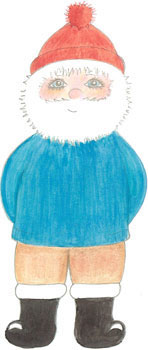
Salty Sam’s Fun Blog for Children
Number 132
Sleeping
Hello Everyone

My nephews Bill and Bob, like most children, don’t always want to go to bed when it is bedtime (unlike a lot of adults who are only too pleased to fall into bed after a hard day’s work) or as my Cockney cousin Smiley Sid would say, “go up the wooden hill to Bedfordshire to visit their Uncle Ned” (bed)! ![]()
l tell them for some reason – magical or otherwise – children only grow at night, which is why it is so important to get enough sleep.
Sleep also helps healing, which is why you sleep so much when you have really bad flu.
On average, people spend about one quarter to one third of their lives sleeping – although nobody knows all the reasons why. A lot of people say that one hour of sleep before midnight is worth two after midnight so it is good not to go to bed too late.
We do know that the brain changes the way it works while we are asleep, so maybe it needs to do this to rest and then work properly the next day when we need it to do so many things with it.
When people are deprived of sleep (prevented from sleeping) they become ill and confused. They have hallucinations – that means they see things around them that aren’t really there.
Warm-blooded creatures like mammals and birds need more sleep than cold-blooded ones like reptiles and fish.
Have you noticed that when you are tired or bored you start yawning? Have you noticed that yawning is infectious? That means that when you see someone yawning you want to do it too! ![]()
Yawning forces more oxygen into the brain – hopefully waking you up and making you more alert.
Also, have you observed that when you have a head cold your nose stops running when you go to sleep?
(Another thing you may have noticed is that you can’t sneeze with your eyes open? Try it – l bet you can’t!)
We have many words to describe sleep. We say having a nap or a kip or a snooze. Some people say that they are going to have forty winks.
Some countries that are really hot shut their shops in the middle of the day and have a sleep called a siesta.
The phrase ‘dropping off’ refers to when people went to sleep on top of a stage coach on long journeys. When they dropped off to sleep they literally dropped off the coach!
Some poor people suffer with something called insomnia. This means that they can’t sleep properly through the night. ln very rare cases people can’t sleep at all – maybe for years they have not slept. So they spend all night finding quite things to do like reading books so that they don’t disturb their family while they are asleep.
l don’t think that telling your mum and dad that you have become an insomniac is a good excuse for getting out of bedtime though. l don’t think it would work.
Scientists are studying why people sleep, and also why some can’t sleep and are still looking for answers.
They do know though, that eating lettuce just before you go to bed helps you sleep and eating cheese gives you vivid dreams.
Some people think that your dreams have meanings and there are books called dream dictionaries that try to explain what your dreams mean.
Well, it is my bedtime now so…
Bye bye everyone – don’t forget to subscribe to my blog!
lf you like my blog, please support it by telling all your friends and followers about it.
Thank you!
And see you again next Fun Friday!
Love and kisses
Salty Sam

www.christina-sinclair.com

Bill and Bob’s Joke of the Week![]()
![]()
Bob: What is the one question you can never answer?
Bill: l don’t know. What is the one question you can never answer?
Bob: Are you asleep?
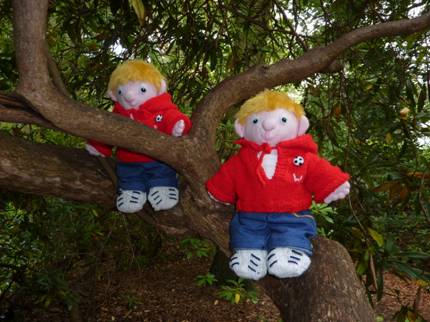
Salty Sam © Christina Sinclair 2015
Unauthorized use and/or duplication of material from this blog without express and written permission from this blog’s author and owner is strictly prohibited.
Links may be used to www.christina-sinclair.com

Picture Gallery
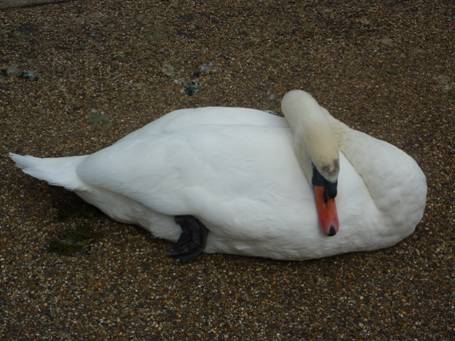
All animals need to sleep – this swan is having a daytime snooze
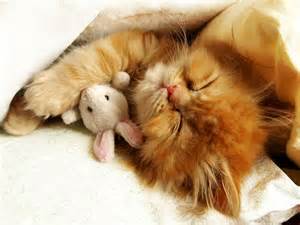
Some animals sleep more than others

If an animal is ‘nocturnal’, it is awake for most of the night and asleep for most of the day

A diagram showing the different parts of a human brain
The front is on the left and the back is on the right
(It is not really these colours – it is white in reality)
Different parts perform different functions – for example memory and artistic ability

 THE SALTY SAM NEWS DESK
THE SALTY SAM NEWS DESK

My best friend Captain Jack lives at Mrs Miggins’ boarding house at the Rocky Bay Harbour.
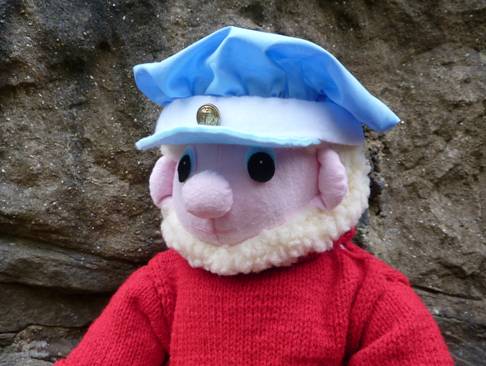
He really likes it there. The house is warm and cosy and he has a nice room overlooking the water.
There is a little courtyard garden to the back of the house and the Rusty Anchor is only a short walk away. There he can meet up with any number of locals for a chat and a game of darts or skittles.
Mrs Miggins is a lovely lady but she does have some strange house rules!
![]()
|
HOUSE RULES
Clean up after yourself
If you switch it on, switch it off
If you move it, move it back
No best crockery in the garden
No break-dancing in the kitchen
No food outside the kitchen
No crumbly biscuits in bed
No golf practice in the back garden
No karate practice inside the house
Don’t glue anything to the walls
No pet smaller than an elephant allowed
No elephants allowed
Share everything except bad smells
No bad singing in the bathroom
No out-of-tune whistling in the kitchen
No strange noises after 10 pm
Always let the cat do whatever it wants
Thank you for noticing this notice |


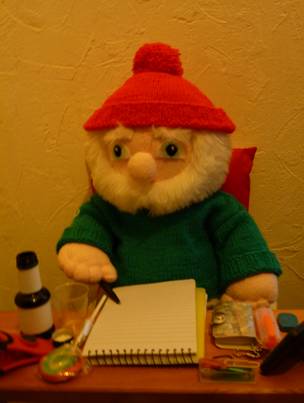
Working late into the night on my blog again
after meeting Captain Jack at the Rusty Anchor

*********************
TO ADVERTISE ON THIS BLOG
PLEASE CONTACT:
christina.sinclair.ads@aol.co.uk
*********************


Crafty Tip
This is a really easy pattern to use to make a duvet and pillow for your dolls’ house.
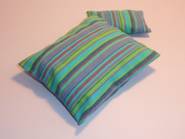
lf you find stitching in a straight line difficult, draw pencil lines where you want your seams to be on the wrong side of the fabric.
Choose a fabric with a tiny print to fit into the scale of a dolls’ house and always make sure that you use fabrics that will not fray easily when making small objects with small seams.
Measure the length of your doll’s bed from the base to half way up the pillow and add a 1cm overhang at the bottom if the bed does not have a tailboard.
Measure the width of the bed and add 2cms.
(*Then add 1cm to each length or more if you want to sew your seams on a machine.)
Sew up the bottom and side seams, or cut a double length so that you have no bottom seam (without adding the seam allowance to the length).
Stuff with wadding or a tiny amount of stuffing then tuck down the top into the inside and sew across using over-sew stitching.
Make the pillow (according to the size of your doll bed) in the same way but stuff from the end/side.
Of course this pattern could be scaled up to fit a twelve inch doll bed instead.
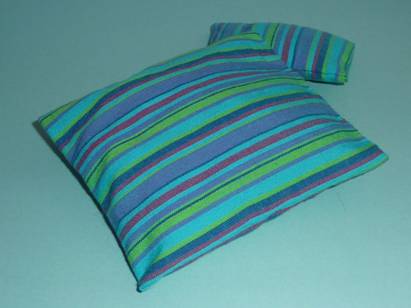
BLOW MY FOGHORN!!!
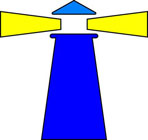
PLUS
Salty Sam fans can join in with their comments and share them with children all over the world. You will need to ask permission if you are not an adult.
Enter your e-mail address to subscribe to my blog and receive new Salty Sam Blog Posts for free by e-mail every week. Your address will be kept private and will not be shared with any third party.
Sign me up at the side bar



lt’s the Weekend!

HOW TO MAKE A CUDDLY TEDDY
FUR TEDDY
Make sure that you use fabric that doesn’t fray very easily because you will be working with very small seams (1/2 cm/3/8 inch). This teddy is more difficult to make than the felt teddy (Blog Post 84).
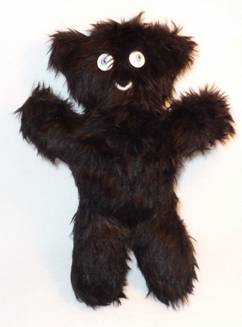
- Cut out two pieces of fabric.
- Sew on two eyes very securely – these can be two buttons or shop bought toy eyes.
- Embroider on the nose and/or mouth using very thin yarn or embroidery thread in any colour you like to contrast with the fabric.
- Sew seams with right sides of fabric together – make sure that you push in the fur pile as you go so that it will cover your seams when you turn the bear right sides out.
- Use running stitch or back stitch but make sure the stitching is very secure.
- Leave a gap at the side under the arm.
- Make sure that your stitching matches on both sides like an exact mirror image so that your bear will have an even appearance.
- Clip the curved seams very carefully so that you don’t cut the stitches (this means snip from the edge towards the stitching). If you accidently cut your stitching, don’t panic, just do a quick repair with a few stitches in the same place to hold the slit together and sew another line of stitches over the ones that you already have there to make the line stronger – but of course prevention is always better than cure.
- Turn the fabric right sides out – use little bits of stuffing as you go because if you use large balls they will lump up.
- Sew up the gap in the side by using ladder stitch or over-sew neatly.
There are some extra things to remember when you are working with fur fabric. Once you have mastered the technique you can move on to making a teddy with more than two pieces of fabric. Kits are available for all sorts of furry animals and they have instructions to help you.

A bear in the woods
TIPS FOR SEWING FUR FABRIC
- Arrows on pattern pieces show you the direction of the pile (the direction the fur is running to).
- When you need to cut two pieces of a shape you will probably need to cut a mirror image.
- When you cut fur fabric always cut the base and not through the fur – that is to say push your scissor tips under the pile (fur) so that you don’t cut the fur at all, only the fabric underneath.
- When you sew fur fabric, push the pile into the seam as you go so that when you turn the sewing out the right way the fur will cover your seam. (Otherwise you will have bald seams.)
- When you thread your needle, use the end that comes off the reel first.
- Don’t have your thread so long that it knots up as you sew.
- Don’t use beeswax on your thread.
- A ‘gusset’ is the name of a piece of fabric that makes your project three dimensional like the strip down the middle of a teddy’s face.
- It is a good idea to keep your work in a bag to keep all the pieces together until you need them.
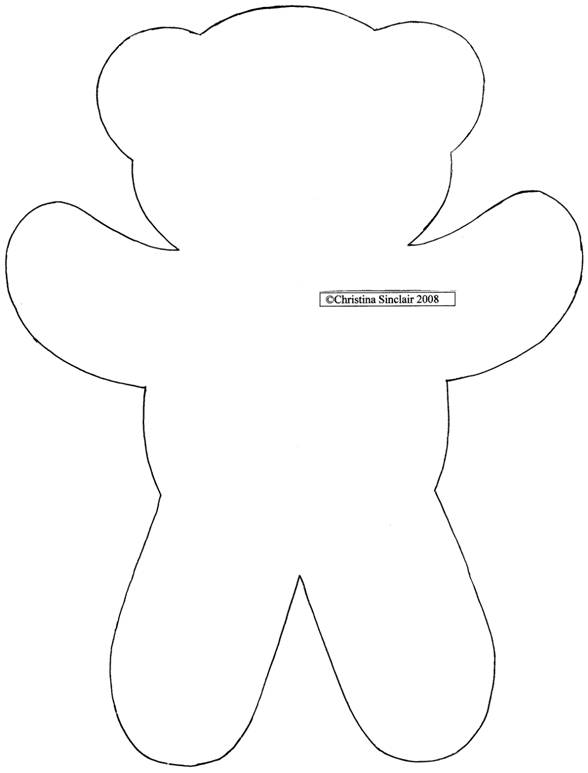
This pattern has small seam allowances
TEDDY SCARF
You can make your teddy bear into a football/baseball/basketball/netball/rounders mascot by making him/her a scarf using the colours of your team or if you are not a sports fan, just use odd ends of yarn to make a plain or stripy scarf.
In fact, you can buy fur in all sorts of different colours now so you could even have a brightly-coloured teddy to start with!
This is a good knitting pattern for a beginner.
Using 4mm knitting needles and dk yarn cast on 8 stitches
Using the first colour
Knit 1 row
Purl 1 row
Purl 1 row
Knit 1 row
Repeat these 4 rows 2 times more (12 rows)
Using the second colour
Knit 1 row
Purl 1 row
Purl 1 row
Knit 1 row
Repeat these 4 rows 2 times more (24 rows)
Repeat these last 24 rows 5 times
Knit the first 12 rows again so that you have 13 stripes each with 12 rows of colour. (156 row if you are knitting a scarf in just one colour)
Cast off and darn in all ends using a knitter’s yarn needle.
You can decorate the ends with blanket stitches or tassels.
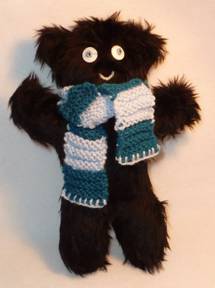
TIP
When knitting a scarf, it is usual to slip the first stitch of every row (except when you change colour) in order to achieve a tight and even edge, however, on such a small item you might find that you achieve a better result by knitting the first stitch of each row and pulling it very tight before proceeding to the next stitch.
TEDDY SECURITY BLANKET
You could also use this pattern to make a teddy security blanket using this pattern.
Cut a square as large as you would like the blanket to be – some sort of fleece would be nice.
Make the top half of the teddy in the same material and sew it onto the corner.
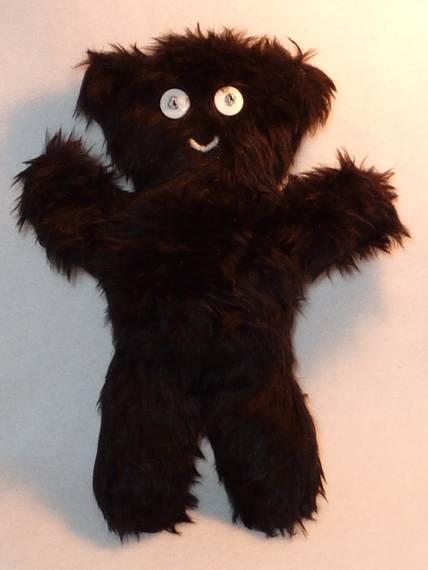
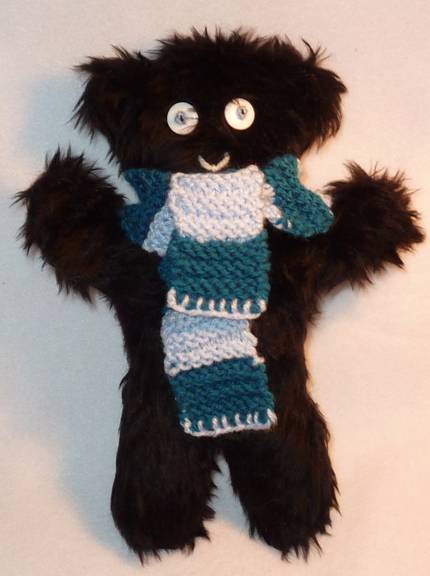
Please note that the material on this blog is for personal use and for use in classrooms only.
It is a copyright infringement and, therefore, illegal under international law to sell items made with these patterns.
Use of the toys and projects is at your own risk.
©Christina Sinclair Designs 2015



